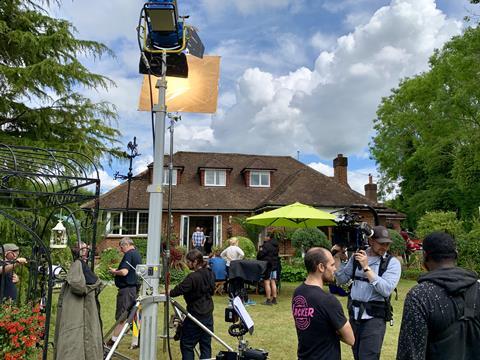 Sponsored content
Sponsored content
The government has laid out a roadmap for gradually loosening the Covid-19 lockdown, but TV and film production companies still face significant challenges in getting back to work

The Department of Digital, Culture, Media and Sport has confirmed film and TV production can restart in the UK – provided all involved abide by social distancing guidelines. However, the need to keep cast and crew safe means that any return to work will hardly be business as usual.
Further workplace Covid-19 guidelines are expected soon from the government following industry consultation on new filming protocols.
New codes of practice
Among the subjects for discussion during that consultation has been the British Film Commission (BFC)’s draft codes of practice for tackling coronavirus – drawn up with input from key industry players including Netflix, Bafta, Disney, HBO and Bectu.
The BFC’s draft is thought to include advice that all productions appoint a properly authorised Covid-19 supervisor to oversee on-set safety and detailed guidance on pre-shoot safety training, testing, quarantining foreign actors, social distancing and catering.
Clearly, there’s huge determination to get the cameras rolling again: Argonon has declared a target of beginning shooting again from Monday (1 June), while Endemol Shine, Fremantle and All3Media have also mapped out plans for resuming filming.
Only time will tell if a June resumption is overly ambitions, and how workable the new Covid-19 filming arrangements will be. The intricacies of amended contracts to take account of coronavirus will take time and money to resolve, while there is concern from some that the industry will be hindered by the government’s proposed 14-day quarantine for anyone travelling to the UK.
Meanwhile, it remains to be seen how difficult it will be to maintain social distancing on set. Will it mean working with skeleton crews? Will crew and cast have to be quarantined on set for a period of time to minimise risk?
Insurance still an obstacle
Another key subject of the industry-wide consultation has been the thorny issue of production insurance – a factor that John McVay, head of UK producers group Pact, has described as the “single biggest obstacle” to getting back to work.
Pact has urged the UK government to follow France’s example of a state-backed fund for film and TV productions that are unable to obtain insurance. France’s €54m (£47.3m) Temporary Indemnity Fund was recently announced by president Emmanuel Macron.
However, until such a fund exists in the UK, broadcasters may need to cover some of the insurance cost to support production companies.
Of course, broadcasters have their own not inconsiderable challenges trying to conserve cash and liquidity – something likely to prompt an acceleration in the trend towards payment on delivery and renegotiation of payment terms.
Managing cashflow
The BFC estimates there has been around £1bn worth of mothballed TV and film production in the UK as a result of Covid-19.
For many smaller production companies specialising in drama, the lockdown resulted in an overnight loss of r evenue, so cashflow is the major headache. Some are adapting faster than others by turning to non-scripted content to keep money coming in.
Meanwhile, while the super-indies have huge overheads to manage, they clearly have the advantage of more diverse portfolios. In their favour, smaller outfits often run quite lean operations, relying on freelance crews on a production-by-production basis.
To date, many companies have relied on extensions to existing bank loans or overdrafts to help manage cashflow, especially with retained profits criteria making it difficult for them to qualify for the government’s coronavirus business interruption loan schemes.
As the weeks go by, however, we may see more companies considering the Coronavirus Business Interruption Loan Scheme (CiBILS) or looking for other options from their banks.
While some production companies have taken up the government’s furlough scheme – now extended to October – there has been some confusion for freelancers over whether they are eligible.
Some indies have furloughed hundreds of freelancers, while others have simply let freelancers go as contracts have ended.
Long-term impacts
On a different note, one of the longer-term impacts of Covid-19 will surely be even greater demand for content as a result of the ever more dominant position of video-on-demand, which has enjoyed such a boom as viewers have turned to their streaming services for entertainment during the lockdown.
Another outcome could be the emergence of new talent where established stars decide to stay away from sets due to the ongoing coronavirus threat.
Further industry consolidation, probably from next year, also seems possible as the larger players pick off more vulnerable smaller operators that have struggled to survive the Covid-19 storm.
But those production companies, of whatever size, that can use Covid-19 as a catalyst for rethinking the kind of content they provide, or employing new tech solutions to produce it, will stand the best chance of emerging stronger when things get back to ‘normal’.








